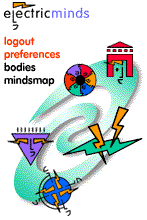
|

|

Sex, Death, and Crash My first car crash happened sixteen years ago, but I remember it as well as if it had happened this morning. The car was a silver-grey Toyota Corolla made in the mid-seventies. I was in the passenger seat; one friend of mine was driving and another was in the back seat. Outside the small village of Deer Isle, Maine, is a flat ninety-degree curve. While the curve is well marked, the driver was paying attention to something else. The car entered the curve travelling at about 40 miles an hour, far too fast to hold the road. It slid across the opposite lane, over the sandy shoulder, lost a little speed rolling over a grassy field, and then slammed head-on into a maple tree. Nobody died. If you saw the crashed car, this would surprise you. It was totally destroyed, inside and out. The force of the impact broke the front axle. It shoved the engine up into the hood and the drive shaft down into the ground. The dashboard snapped. The rear axle broke. Inside the passenger compartment, the scene was no less violent. I was the most fortunate my body gave up all of its kinetic energy by snapping against the shoulder and lap belts. The driver's body, also belted in, flailed forward the same way mine did, but instead of recoiling harmlessly like a whip cracking in the air, her face smashed against the center of the steering wheel, snapping off one incisor, driving the other deep into her hard palate, and tearing the right corner of her mouth down to her chin. The passenger in the back seat was not wearing a seat belt, and her body continued its forward travel until her shoulders wedged against the two front seats. It rammed into them hard enough to bend their metal frames and pull at the bolts holding them to the car's frame, hard enough to break her collarbone.
Automobiles are everywhere. We need them everywhere few American cities are livable without one. The cost of a car varies across a wide spectrum of makes, models, and years, but they're all expensive. This makes them powerful markers of status. The choice of a car is an expression of personal style, a statement about your wealth, a marker of how you live your life. What you drive tells other people who you are. Cars are also both a product and a symbol of a people taking hold of industrialism. (In India today, the burgeoning number of domestic auto manufacturers are a source of national pride; they feed the growing sense among Indians that their country is finally coming into its own.) They are instruments of personal mastery over space and time. They are tools of freedom. It's also private inside your car. Much of the hold that cars have on our sexual imagination comes from the fact that they are personal spaces. They're easily as intimate as a bedroom. If you can find privacy and quiet nowhere else in your life, you can find it in your car. At the same time, getting into a car with someone carries none of the social connotations that does going into the bedroom and closing the door. As if all these aspects of the car were not enough sign of wealth and status, industrial artifact, symbol of modernism, tool for living, portable cocoon, and private room it can also kill you. "Anyone who owns a frying pan owns death," said William S. Burroughs. But you have to really work to beat someone's head in with a frying pan. Let your attention wander for a moment while you're driving and death can be yours.
I doubt that I would remember my accident in as much detail as I do were it not for J.G. Ballard and his 1973 novel Crash. Crash is a pitiless and obsessive look at the literally incredible destruction that is only a quick swerve away. David Cronenberg's movie of Crash, which won a special jury prize for daring, originality, and audacity at the Cannes Film Festival, has just been released in the US. Crash the novel has just one trick, but it is a brilliant trick. Ballard imagined, and then had his characters assert, that car crashes are erotic. This is not a huge leap. Cars are powerful erotic symbols, and the cataclysmic violence of a car crash, like sex, pushes us into a space where the rest of the world seems to have fallen away and we are left alone to feel the beating of our hearts. By sexualizing the car crash, Ballard created a context in which he was able to examine it on the same terms that writers often use to investigate the sex act: via the fixated gaze of the pornographic imagination. The car crashes in Crash are described in fetishistic detail, with the authorial eye focusing on crushed radiator grilles, dripping hoses, broken mirrors, and cracked instrument panels the way a pornographer would write about taut nipples and moist lips. The result is disturbing, strangely funny, and eye-opening. We drive past car crashes all the time. Ballard makes us look at them, hard. He makes us think about close we are to destruction as we are casually going about our lives. Sex is the bait to get us to think about death. Crash the movie is remarkably faithful to the book, and weirdly engrossing in its own right. But no movie made for theatrical release, NC-17 rating or no, could follow Ballard quite where he was going. Even Cronenberg's considerable genius cannot dispel your knowledge that in this movie the sex is simulated and the car crashes are controlled. The visual pornography of sex provides stark looks at the real thing; so should the visual pornography of car crashes. The real movie version of Crash is in the auto-industry crash-test films that its characters watch on videotape, in which the ripple of crumpling body-panels and the spray of shattered safety glass fill the screen, grainy and artless but unarguably real. |
rlauriston said: I narrowly avoided a car crash once--saw a truck losing control, floored the engine, looked in the rearview, and saw the truck jack-knifed across all four lanes of Interstate 80, and cars smashed up every which way. I think maybe that was when I refused to ride in cars for a couple of years. In any case it was much more disturbing than any of the three relatively minor crashes I was actually in myself. But it didn't make me horny--maybe that's because Rosanna Arquette wasn't along for the ride. Most Active Topics: Topic 108 Sites - Feedback from visitors Topic 98 C-Topia Zeit and Nancy Swim the Channel Topic 101 C-topia Prepping for Utne | |||||||||||
Have you ever been in a crash? | ||||||||||||
Also in Technos: The Technology of Surgery Our New Cathedral Beethoven's Fifth Symphony | ||||||||||||
|
electric minds |
virtual community center |
world wide jam |
edge tech |
tomorrow |
conversations
Any questions? We have answers.
©1996, 1997 electric minds, all rights reserved worldwide.
|


